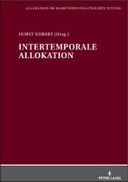Explore
Bei wirtschaftlichen Aktivitäten fallen Kosten und Nutzen in der Regel zeitlich auseinander. Deshalb verlangen Entscheidungen über die optimale intertemporale Allokation ein Abwägen des gegenwärtigen Nutzens mit den Opportunitätskosten der Zukunft. Dieses Prinzip optimaler intertemporaler Allokation wird auf Fragen aus unter- schiedlichen Problembereichen wie Arbeit, Wohnen, Kapital, Boden, natürliche Ressourcen, Öffentliche Güter, Umwelt, Energie und Staatsverschuldung angewandt.
This book is included in DOAB.
Why read this book? Have your say.
You must be logged in to comment.
Rights Information
Are you the author or publisher of this work? If so, you can claim it as yours by registering as an Unglue.it rights holder.Downloads
This work has been downloaded 71 times via unglue.it ebook links.
- 71 - pdf (CC BY) at OAPEN Library.
Keywords
- Economic systems & structures
- Economic systems and structures
- Economics
- Economics, finance, business & management
- Political Science & Theory
- Political science and theory
- Politics & government
- Society & Social Sciences
- Society and culture: general
- Sociology & anthropology
- thema EDItEUR::J Society and Social Sciences::JH Sociology and anthropology
- thema EDItEUR::J Society and Social Sciences::JP Politics and government::JPA Political science and theory
- thema EDItEUR::K Economics, Finance, Business and Management::KC Economics::KCS Economic systems and structures
Links
DOI: 10.3726/b14080Editions

